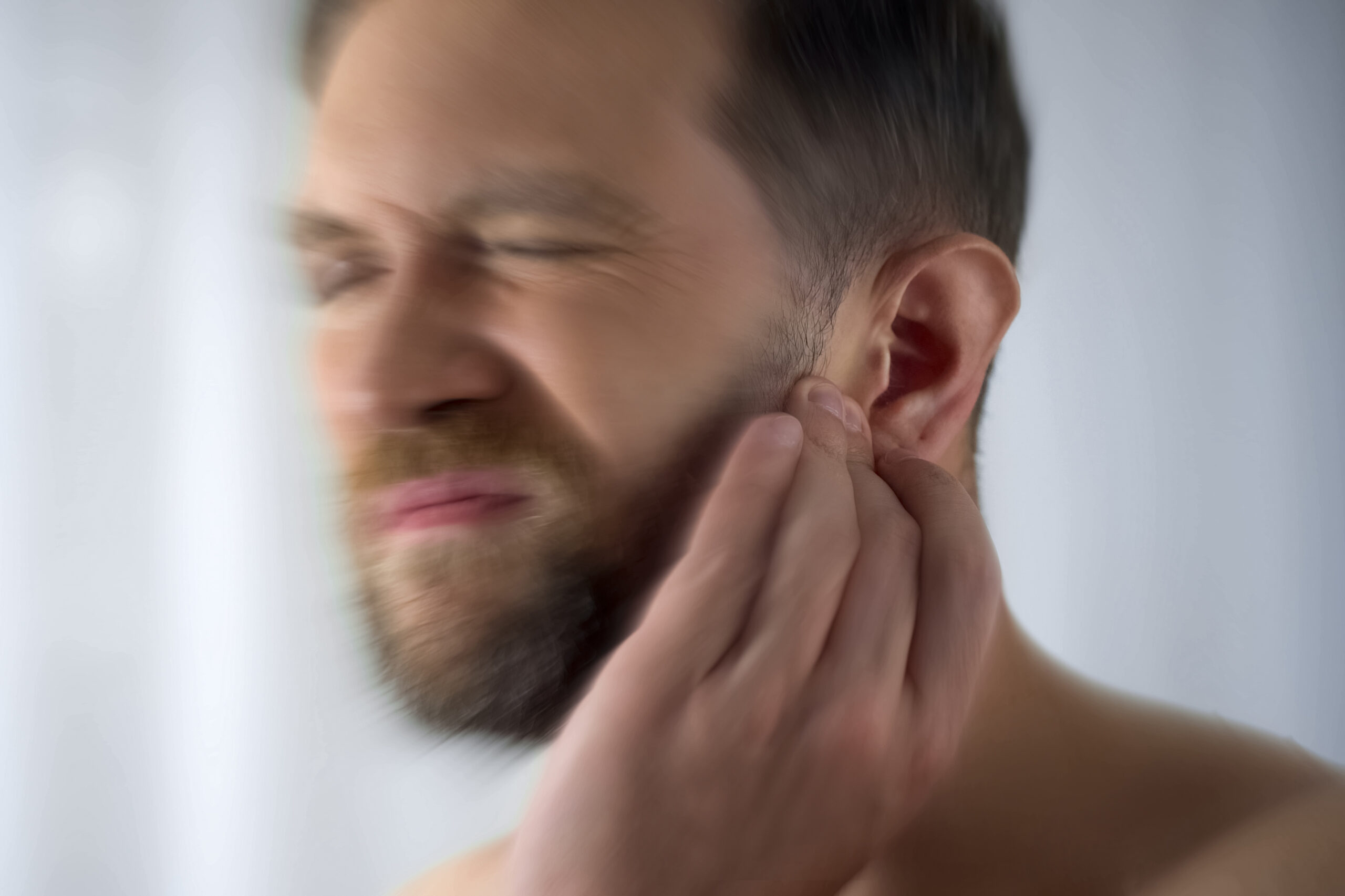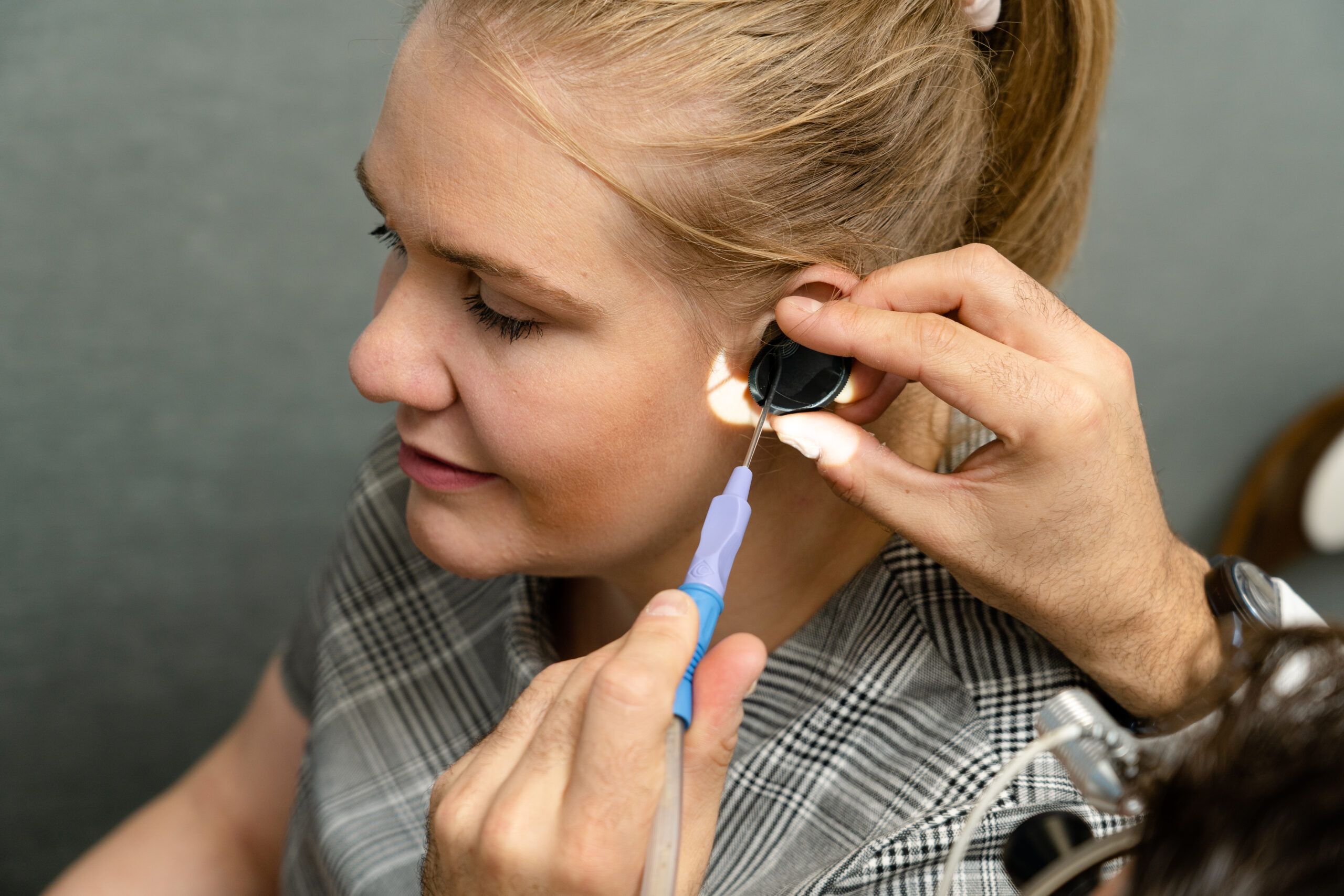A persistent and ongoing itching inside your ears can be distracting and even embarrassing when you are constantly compelled to itch – and this could be down to all sorts of issues, from earwax build-ups to allergies, infections, and blockages.
Getting your ears checked is worthwhile whenever you experience ongoing itching, not only to gain relief from an irritating sensation but also because there is often an easily identifiable cause we can rectify quickly.
Our first advice is to try to avoid the temptation to scratch and itch as much as possible since excessive scratching could exacerbate the issue or cause damage to the delicate inner ear. We also advise against trying to clean your ears with a cotton bud for the same reasons, coupled with the risk of pushing impacted wax or a blockage deeper into the ear canal.
Let’s take a look at some of the many underlying reasons for itching inside your ears, the tests we’d suggest to diagnose the cause, and the treatment options to resolve the itch once and for all.
Itching Inside Your Ears: Quick Facts
- Minor and occasional itching inside your ears is rarely any cause for concern. A tickle rather than an intense itch is probably due to dry air, exposure to dust, or a small amount of earwax.
- More intense, pronounced, and prolonged itching should be checked out because leaving it untreated can mean the itching intensifies and becomes a serious issue. At-home remedies are best approached with caution to avoid making the itching sensation worse, especially if you have never had similar symptoms before.
- Diagnosing an itchy ear is usually straightforward, and Regain Hearing can use safe, pain-free checks like a video otoscopy to examine the inside of your ear and identify any causes of the itch—and how best to resolve them.
Common Causes of an Itch Inside Your Ear
1. Ear Wax Buildup
The typical reason for itching inside one or both ears is a build-up of earwax. We all produce wax to keep dust, dirt, and bacteria out of our ears.
However, an accumulation of wax can cause an itch, and if that build-up forms a hard blockage, it can bring with it additional symptoms, including:
- Pain and soreness
- A sensation like your ears are full or plugged
- Difficulties with hearing
- Tinnitus – or ringing in your ears
- Coughing
- Dizziness and vertigo
Suctioning out excess wax, especially if you have dried wax that has formed a solid blockage, is always the best way forward. That is because trying to syringe blocked ears or using cotton buds can injure your eardrum or even trap water behind the wax, making it far more likely you will develop an infection.
What do our audiologists say?
[quote photo=”lee” name=”Lee Fletcher” title=”(RHAD), (BSHAA), Ba(Hons)]Itchy ears might seem like a small annoyance, but they can be a sign of something deeper – from wax impaction to allergies or infection. We always recommend getting any persistent itching checked by a professional, as a quick examination can often pinpoint the cause and lead to fast, effective relief.[/quote]
2. Ear Infections and Inner Ear Itching
The next possible cause is an ear infection. This can be prompted by a wide variety of viruses and bacteria and is more frequent when you’re suffering from allergies, a common cold, or the flu.
Outer ear infections, like swimmer’s ear, can also cause itching. Exposure to moisture impacts the skin and tissue that defend your ears from germs in the ear canal, and itching is a frequent symptom.
All of the below may be a sign your itching is indicative of an ear infection:
- Sensations of fluid in the ear
- Hearing difficulties
- Soreness and pain
- A high temperature
- Headaches
- Loss of appetite
In infants, we look for subtle signs like changes in sleeping or an inability to sleep, pulling and tugging at the ear, and general malaise and upset while checking the ear to verify whether there is indeed an infection present.
Most infections can be cleared up with ear drops, proper cleaning, and potentially antihistamines or antibiotics if the discomfort is related to allergies or bacterial infections that won’t go away by themselves.
3. Itching Inside Your Ear and Skin Allergies
Our ears are sensitive and are regularly impacted by allergic reactions. This might be connected to a new beauty or cosmetic product you are using, where shampoos, hair masks, soaps and hair sprays can all cause issues within your ears.
Likewise, allergies to nickel and other metals in earrings, the plastic or rubber used in hearing aids, protection devices and headphones can also contribute to allergies and itching.
It’s also common for other allergies and skin sensitivities to cause difficulties with your ears that often lead to itching and discomfort, including the following:
- Eczema, hay fever, and dry skin conditions may make you more likely to experience itching inside your ears. This occurs because the irritation is impacting the sensitive ear canal or because eczema or a related concern is present within the ear.
- Psoriasis, a skin disorder connected to the immune system, causes skin to become very dry and inflamed in patches. This can cause itching on the outside and within the ears.
- Certain foods, like tree nuts and some vegetables, can trigger food allergies, particularly pollen and hay fever, which usually occur during allergy season with symptoms like sneezing, puffy eyes, coughing and itchy ears.
Fortunately, most sensitivities and allergies that cause prickling or itching in the ears can be resolved with antihistamines, topical treatments, or by avoiding triggers that cause allergies to flare up.

Alternative Reasons Behind Itching Inside Your Ears
We’ve covered the typical reasons for itching in your ears, but this isn’t exhaustive, and there are also other possible factors, such as:
- Temporomandibular disorder, or jaw pain – a condition often caused by grinding your teeth at night, high levels of stress and tension, or regularly clenching your jaw. This can cause problems with the muscles and bones around the jaw and create discomfort, irritation, and itching in your ears.
- Keloid scar tissue is another culprit sometimes behind itching, and although this isn’t a serious condition, the itching sensation can be severe.
If you have known issues with teeth grinding, a thicker patch of scar tissue around your ears linked to a tattoo, insect bite, acne scarring, burns, or ear piercing, this could well be the reason for the itching.
Keloid-related itching is more likely if you have a visible bump or deviation in your skin, a discolouration between scarring and other skin, and tenderness in the area.
Finding the Causes and Treating the Underlying Reasons for Inner-Ear Itching
As always, the best advice if you have any issues with your ears, including itching that doesn’t go away, returns frequently, or is becoming worse, is to contact your nearest Regain Hearing clinic.
We’d recommend making an appointment as soon as possible either with our expert audiologists or with your GP if you have other symptoms, including:
- Pain in your ears
- Fever or a fluctuating temperature
- Itching that is serious enough to interrupt your sleep or disrupt your daily routine
- Any other symptoms that are causing concern
Step one is to chat through all of your symptoms, which usually gives us some initial clues as to the possible reasons for the itching and can help rule out specific conditions or allergies that you’d likely already know about.
From there, we can use video otoscopy to carefully examine your ears or run other hearing and ear health checks, especially if one of your symptoms is hearing loss or muffled hearing.
Treatment Options and Therapies to Relieve Itching Ears
Depending on the outcomes of your hearing and ear check, we can provide various recommendations, either to relieve the intensity of the itching, remove the problem altogether, or ensure you take action to treat infections and other underlying causes.
Those might include:
- Earwax microsuction: A clean, safe, and fluid-free process in which we use effective yet gentle suction to remove all traces of wax from your ears, including impacted earwax and harder blockages that are causing irritation.
- Alternative hearing aids, ear care devices or hearing protection, often alongside the use of antihistamines if there appears to be an allergic reaction.
- Suggestions for prescription, allergen-free, or medicated shampoos or advice on seeking help with getting eczema and other skin conditions under control.
- Tinnitus therapies to address ringing, buzzing or humming in your ears – provided these aren’t thought to be caused by an infection, ear wax blockage or other causes we can remedy.
The immediate concern is usually to gain relief from intense itching. By evaluating the causes and performing thorough checks of your ears, we’ll normally be able to provide an accurate picture of the factors behind the irritation during one hearing check.

Specialist Hearing Checks and Guidance to Resolve Itchy Ears
Itching itself is usually nothing to worry about, but we recognise that if it keeps getting worse or intensifies at specific times or during certain activities, it can become a real nuisance.
When itching starts to impact your ability to concentrate and sleep, it needs to be tackled as soon as possible.
If you’d like more help diagnosing the cause of itching inside your ears, have concerns that irritation isn’t getting better, or want to check if an earwax build-up is causing discomfort, you are welcome to get in touch or book an appointment with any of the clinics in the Regain Hearing network.
